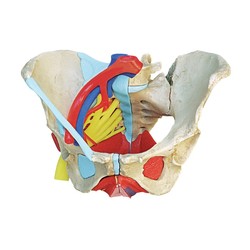The pain you feel from your transvaginal mesh implant may come from the muscles in your pelvis, your pelvic nerves, or a combination of both. “
 The pain you feel from your transvaginal mesh implant may come from the muscles in your pelvis, your pelvic nerves, or a combination of both. There are options to ease your suffering.
The pain you feel from your transvaginal mesh implant may come from the muscles in your pelvis, your pelvic nerves, or a combination of both. There are options to ease your suffering.
Muscular Pain
If your pain comes from the muscles in your pelvis, then you are suffering from something physicians call Myofascial Pain, which possibly results from irritation to the vaginal mesh itself. The medical journal “Up To Date” describes Myofascial Pelvic Pain Syndrome (MPPS) “as a disorder in which pelvic pain is attributed to short, tight, tender pelvic floor muscles.” Your pain may radiate throughout your vagina, rectum, and bladder. You may also feel like you have a bladder infection that never goes away, including pain when you urinate, frequent urination, and a sense that your bladder is full even after you’ve gone to the bathroom. Sex can be very uncomfortable and make you feel like there is fullness in your rectum.
Nerve Pain
Pain that comes from your pelvic nerves is just as intolerable. A nerve called the Pudendal Nerve travels from your lower back into the pelvis and splits into three branches. Your Pudendal Nerve might have been damaged during surgery when the transvaginal mesh was placed. Mesh can also move slightly after surgery so part of it may now be rubbing against this nerve or one of its branches, causing irritation. With nerve damage you will feel pain when you are sitting, pain in the anal region that radiates into your rectum, and problems enjoying sex. Similar to MPPS, you might also have difficulty urinating and a sense of bowel or bladder fullness. In some severe cases a woman may even lose the ability to control her bladder.
Treatment Options
There are treatments that can help you. Some of your first options include physical therapy to strengthen and stretch your pelvic muscles, botox injections directly into those muscles to stop them from cramping, and topical medications such as vaginal valium. If you’ve already tried these treatments and they are not helping, then I recommend a procedure called a nerve block on either the Pudendal Nerve or one of its branches. Based on your symptoms, your doctor will decide which type of block is best for you. If the nerve block works, then surgeons will know the source of the problem; they can go in and reduce the pressure on that nerve.
Arm Yourself with Facts
If you are suffering from any of these symptoms after your transvaginal mesh procedure it’s very important that you speak with your doctor and explore possible treatments. Knowing your options and understanding which structures in your body may be causing you pain will help you and your physician decide together what is best for you. If you would like to learn more about Life Care Planning for Mesh Patients with Chronic Pain, please see additional articles at https://tvm.lifecare123.com
Social Media Tags: pelvic floor muscles, pudendal nerve, pelvic muscles, frequent urination, nerve pain, botox injections, bladder infection, vaginal mesh,transvaginal mesh,greg vigna,






